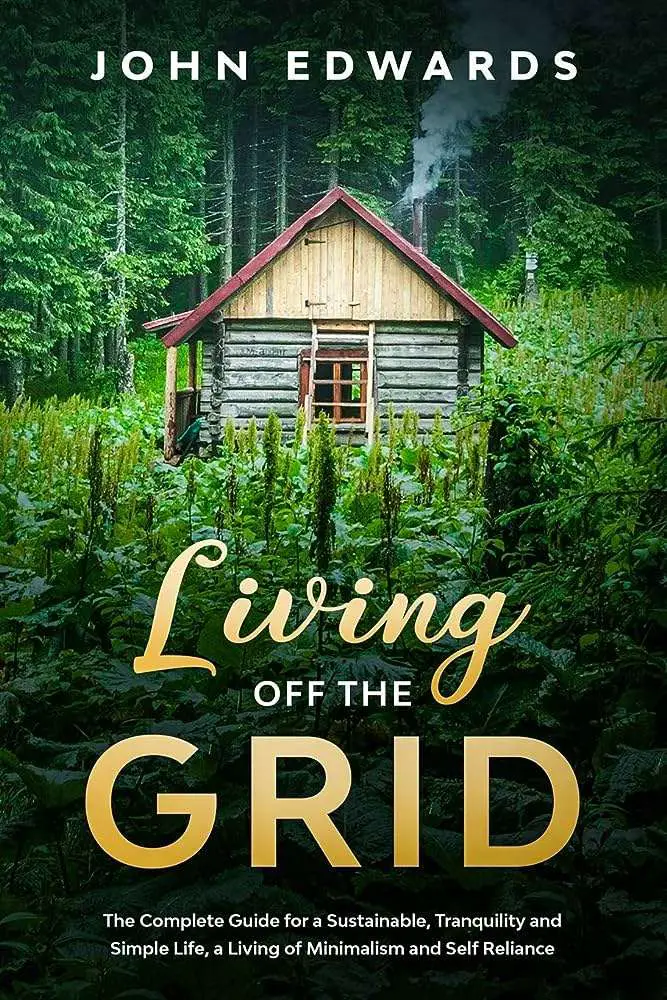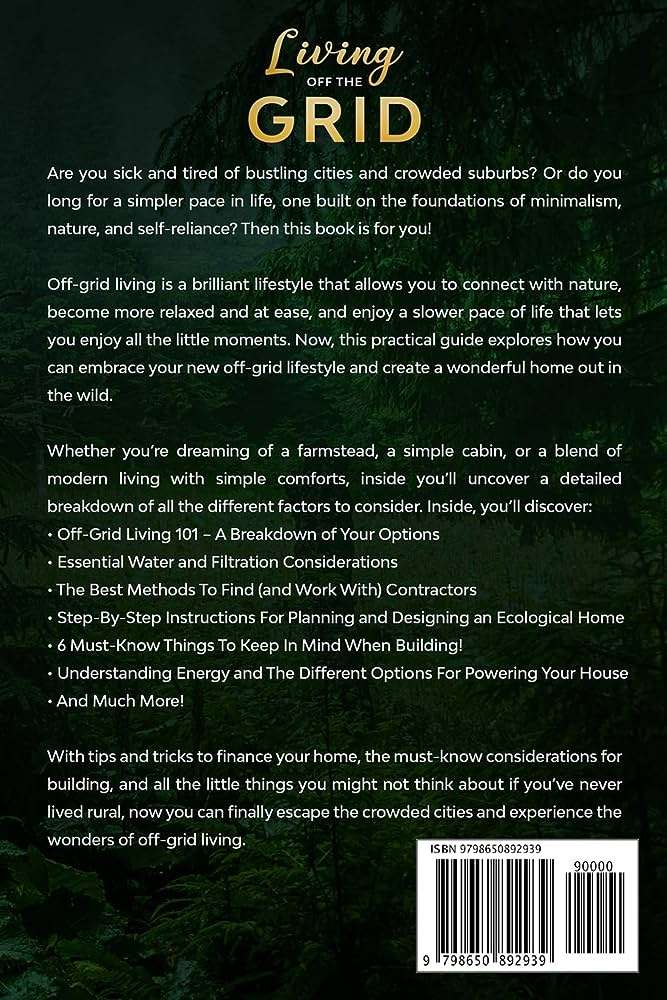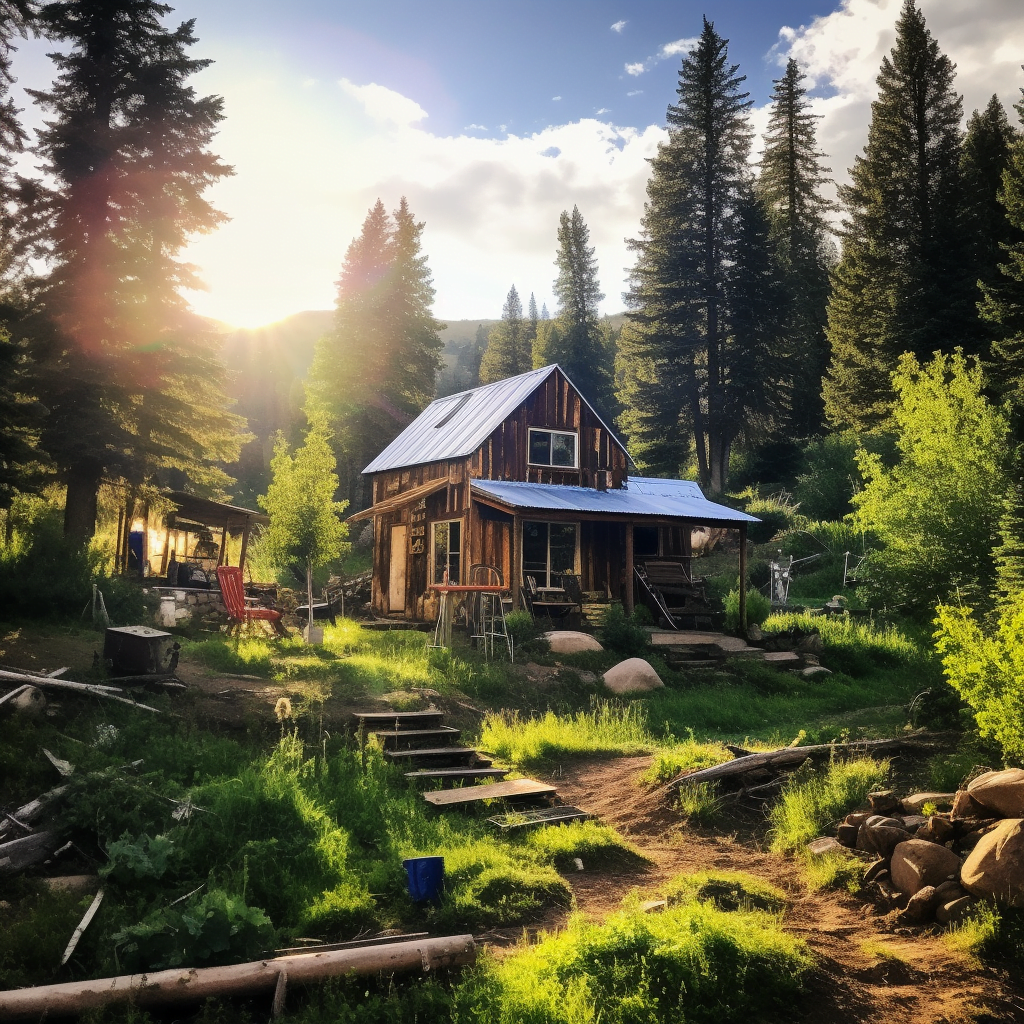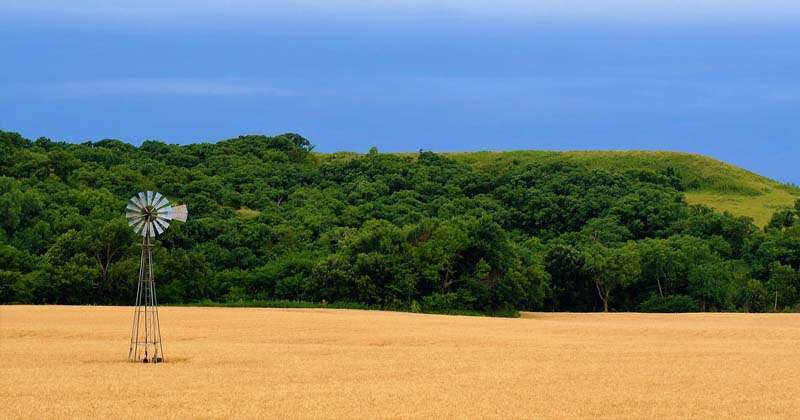Living off the grid is not for the faint of heart. It requires a level of hard work and self-reliance that many people find challenging to achieve. The truth is, not everyone possesses the necessary skills to thrive in a self-sustaining lifestyle. However, those who do manage to make it work often possess a myriad of DIY, land management, and survival skills. From finding and purifying water to harvesting firewood and preserving food, the skillset needed for off grid living is extensive. But it’s not just about practical skills; adaptability, resilience, and a strong work ethic are equally important traits for those who choose to embrace the challenges of living off the grid.

Skills needed for off grid living
Living off the grid requires a specific set of skills that enable individuals to sustain themselves without relying on traditional utilities and resources. These skills are essential for self-sufficiency and ensuring a comfortable and sustainable off grid lifestyle.
Finding, filtering, and purifying water
One of the most critical skills for off grid living is the ability to find, filter, and purify water. Without access to a public water supply, off grid individuals must rely on alternative sources such as rivers, wells, or rainwater collection systems. Knowing how to locate and assess the quality of water sources is crucial to ensure safe and clean drinking water. Additionally, having knowledge of water filtration and purification methods helps to remove contaminants and make the water safe for consumption.
Harvesting firewood
In off grid living, firewood is often the main source of heat for cooking and keeping warm. Knowing how to properly harvest firewood is essential to ensure a steady supply for heating and cooking needs. This includes skills such as identifying suitable trees, using tools to cut and split wood, and properly storing and drying the wood for efficient burning.
Fishing, hunting, trapping, and foraging
Being able to provide for oneself through hunting, fishing, trapping, and foraging is a crucial skill for off grid living. These skills enable individuals to obtain protein-rich food sources directly from nature. Understanding the local flora and fauna, knowing how to set traps or snares, and having the patience and knowledge to fish or hunt sustainably are all vital skills that contribute to successful off grid living.
Gardening and composting
Off grid individuals often rely on gardening for a steady supply of fresh fruits, vegetables, and herbs. Having the knowledge and skills to grow and maintain a garden is essential for sustainable food production. This includes understanding soil composition, irrigation methods, pest control, and crop rotation. Additionally, knowing how to compost organic waste is crucial to create nutrient-rich soil for gardening.
DIY skills
DIY skills are essential for off grid living as they allow individuals to repair and maintain their infrastructure and equipment without relying on outside help. This can include skills such as carpentry, plumbing, electrical work, and general construction. By possessing these skills, off grid individuals can troubleshoot and address any issues that arise, ensuring the longevity and functionality of their off grid setup.
Preserving food and processing meat
In off grid living, it is important to know how to preserve food and process meat to ensure a reliable food supply throughout the year. This includes skills such as canning, drying, fermenting, and smoking food. Being able to properly handle and process meat is also crucial to prevent spoilage and maximize its shelf life. These skills enable off grid individuals to preserve their harvest and be more self-sufficient in terms of food production.
Survival and self-defense
Living off the grid often means being in remote and isolated areas where self-reliance and self-protection are important. Having survival skills such as building a shelter, starting a fire, and navigating in the wilderness can be life-saving in emergency situations. Additionally, knowing self-defense techniques and being able to protect oneself and loved ones is a crucial skillset for off grid individuals.
Cooking and personal hygiene
Off grid living requires individuals to be self-sufficient in terms of cooking meals and maintaining personal hygiene. Having knowledge of cooking methods that are suitable for off grid setups, such as using a wood-burning stove or solar cooker, is essential. Additionally, understanding how to properly manage waste and maintain personal hygiene without relying on traditional utilities is important for a comfortable and healthy off grid lifestyle.
Raising livestock
For individuals who choose to raise livestock as a source of food or other resources, knowledge of animal care and husbandry is essential. This includes skills such as feeding, sheltering, and breeding animals, as well as managing their health and well-being. Understanding the specific needs of each type of livestock and being able to provide for them is crucial for a successful off grid farming operation.
Repair and maintenance
In off grid living, individuals must have the skills to perform repairs and maintenance on their infrastructure and equipment. This includes skills such as basic carpentry, plumbing, electrical work, and mechanical repairs. By being able to address any issues that arise, off grid individuals can ensure the continued functionality of their systems and reduce the need for outside help.
First aid
Living off the grid often means being far away from emergency medical services. Therefore, having basic first aid skills is crucial for addressing any injuries or medical emergencies that may occur. This includes knowledge of CPR, wound care, fracture stabilization, and recognizing and treating common illnesses or injuries. Having a well-stocked first aid kit and knowing how to use its contents is also important for off grid living.
Crafting
Being able to craft essential items is a valuable skill for off grid individuals. This includes skills such as woodworking, metalworking, sewing, and weaving. By being able to create or repair items as needed, off grid individuals can reduce their reliance on outside sources and ensure they have the necessary tools and items for their daily needs.
Money management
Living off the grid often means having limited sources of income or living on a tight budget. Therefore, having good money management skills is crucial for financial stability and long-term sustainability. This includes budgeting, tracking expenses, finding ways to save money, and being resourceful in managing finances. By having a solid understanding of personal finance, off grid individuals can make informed decisions and ensure their financial well-being.
Challenges of living off the grid
While living off the grid offers many benefits, it also presents various challenges that individuals must overcome. Understanding and addressing these challenges is essential for a successful off grid lifestyle.
Lack of necessary skills
One of the biggest challenges of living off the grid is a lack of necessary skills. Many people are not equipped with the knowledge and experience needed to thrive in a self-sufficient lifestyle. This can result in difficulties in finding and purifying water, sourcing firewood, obtaining food through fishing, hunting, trapping, and foraging, and maintaining a productive garden. Without the necessary skills, individuals may struggle to adapt to the demands of off grid living.
Adaptability and resilience
Living off the grid requires individuals to be highly adaptable and resilient. This lifestyle often involves unpredictable circumstances, such as extreme weather conditions or unexpected equipment failures. Being able to adapt to these changes and bounce back from setbacks is crucial for maintaining a sustainable off grid lifestyle. It requires a strong mindset and a willingness to learn from challenges and mistakes.
Acquiring new skills
In order to overcome the challenges of off grid living, individuals need to be open to acquiring new skills. This may involve learning from experienced individuals, seeking out education and training, using online resources and books, or joining workshops and community groups. The ability to continuously learn and expand one’s knowledge is essential for successful off grid living.
Workload and time management
Living off the grid often involves a significant workload and responsibilities. Balancing various tasks, such as maintaining infrastructure, gardening, tending to livestock, and managing household chores, can be overwhelming without effective time management skills. Developing efficient routines, setting realistic goals, and delegating tasks when possible are all important for managing the workload and ensuring a balanced and sustainable lifestyle.
Limited access to resources
Living off the grid often means having limited access to resources that are readily available in traditional urban or suburban settings. This can include scarcity of water sources, availability of firewood, access to fishing, hunting, and foraging areas, availability of fertile land for gardening, availability of materials for DIY projects, access to food preservation techniques, and access to medical supplies and first aid knowledge. Off grid individuals must be resourceful and find alternative solutions to meet their needs.
Unpredictability and challenges of nature
Living off the grid means being at the mercy of nature and its unpredictable elements. Dealing with extreme weather conditions such as storms, floods, or hurricanes can pose challenges to off grid individuals. Protecting crops and livestock from pests and diseases, addressing natural disasters and emergencies, managing wildlife interactions, and navigating terrain and natural obstacles can also be demanding tasks. Being prepared and having contingency plans are essential for mitigating the risks associated with nature’s unpredictability.
Isolation and social challenges
Living off the grid often involves living in remote areas with limited social interaction. This can lead to feelings of loneliness and isolation, especially for individuals who are used to more social connections. Building and maintaining relationships with like-minded individuals or creating a supportive community is important for off grid individuals to combat isolation and adapt to a different social dynamic.
Health and medical emergencies
Living off the grid means being far away from immediate access to medical services. This poses challenges in handling health issues and medical emergencies. Off grid individuals must be equipped with basic first aid knowledge and have access to well-stocked first aid kits. They must also have a plan in place for getting medical help in case of serious emergencies. Maintaining good overall health and prioritizing preventive care are crucial for avoiding major health issues.
Lack of modern comforts and conveniences
Living off the grid often means sacrificing some modern comforts and conveniences that are readily available in traditional settings. Limited or no access to electricity, running water, internet connectivity, or modern appliances can be challenging for some individuals. Adapting to a simplified and minimalist lifestyle, finding alternative solutions, and embracing the slower pace of off grid living are important for overcoming this challenge.
Financial challenges
Living off the grid can also present financial challenges. Generating income or living on a limited budget requires effective budgeting and expense management skills. Balancing off grid expenses with sustainability goals and navigating economic changes and fluctuations can be demanding. Off grid individuals must be resourceful and find ways to maximize their financial resources while maintaining their self-sufficiency and sustainability goals.
Overall, living off the grid requires a combination of various skills and traits such as self-reliance, adaptability, resilience, and a strong work ethic. By understanding and addressing the challenges that come with this lifestyle, individuals can embrace the rewards and freedom that come with living off the grid.





